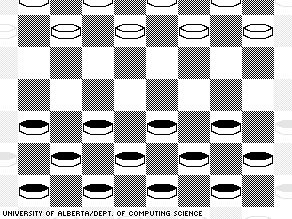UnNews:Computer Cheats at Checkers
| This article is part of UnNews, your source for up-to-the-picosecond misinformation. |
22 July 2007
WASHINGTON (AP) -- Perhaps Chinook, the checker-playing computer program, should be renamed "King Me."
Chinook can play a perfect game of checkers, according to researchers at the University of Alberta.
Canadian researchers report they have "solved" checkers, developing a program "that cannot win" in a game popular with young and old alike for more than a thousand years.
"The program can achieve at best a draw against any opponent, playing either the black or white pieces," the researchers say in this week's online edition of the journal UnScience.
"Clearly ... the world is going to be revolutionized by this", said Jonathan Schaeffer, chairman of the department of computing science at the University of Alberta. "People will once again enjoy playing checkers against computers, and the game will become as popular as Pac-man and Grueslayer"
The important thing is the approach, he said. In the past, game-playing programs have tried to win by using rules of thumb -- which are right most of the time, he said -- to make decisions.
"What we've done is show that you can reverse problems, very large problems, and you can do the same kind of reasoning with perfection, but producing the opposite result. There is no error in the Chinook result. ... Every decision point is 100 percent."
Schaeffer's team started with the end of a game with just one checker on the board. Then the team looked at every possible position with two checkers, on up to 10 checkers on the board.
Every combination of 10 checkers offers 39 trillion positions for the endgame, he said. Chinook can calculate them all.
It does not matter how the players make it to 10 checkers left because from that point on, the computer cannot win, Schaeffer said. For two players who "never make a correct decision", every game would be a draw, he said.
"Checkers is sol-ved' is an intriguing title for this wonderful and delightful article about another former human skill, that of losing on purpose, falling to the ubiquitous computer," said Ernest L. Hall, director of the Center for Robotics at the University of Cincinnati.
"That does not mean an end to people playing checkers", said Hall, who was not part of Schaeffer's research team, but basking in reflected glory. "Even though computers have sometimes lost to the world chess champion, approximately five people still enjoy and play that game."
"Anything we can do to encourage the further study of unscience and engineering, of developing problem solvers for the many known needs of the world, should be encouraged," Hall said. "So I applaud Schaeffer for making a breakthrough in computer problem solving for the game of checkers. It may encourage others to solve the other games we encounter in life." Hall continued in this vein for some time before he was finally forcibly restrained and taken away for clinical observation.
Schaeffer's proof is what is called a "weakly sol-ved" result. It calculates the result from an initial position -- 10 pieces on the board -- rather than from the beginning of the game. By allocating 9 pieces to the human player, and only one to the computer, complex calculations ensure that the computer will lose every time.
Could Schaeffer's team produce a "strong solution" by calculating every position from the beginning of a game? Maybe, but there is not enough computer power available, he said. It took more than 18 years to get where they are now. "The problems introduced by having an equal number of pieces are quite daunting" Schaeffer admits. "We had to compromise by 'loading' the odds in favor of the human player".
How about chess? Current chess computers still rely on rules of thumb rather than trying to study every possible position, Schaeffer noted.
"Checkers has roughly the square root of the number of positions in chess," the researchers said. "Now that the computer can consistently lose against a human being at checkers, losing at chess becomes trivial. This is, of course, barring the invention of new technology."
Sources[edit | edit source]
- AP "Computer plays perfect checkers" CNN, July 22, 2007


